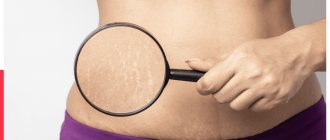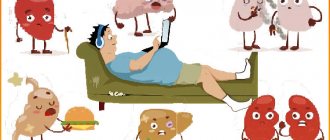Features of the disorder
Psychogenic vomiting is a disease that is diagnosed in emotionally unstable people. It is manifested by a feeling of nausea and involuntary release of gastrointestinal contents, which occurs during a period of nervous shock or experience, and goes away on its own as the intensity of the emotion decreases. In other words, these reactions from the gastrointestinal tract have a stable acquired reflex character and are a kind of reaction of the patient’s psyche to the external environment.
Modern medicine has come to the conclusion that the described eating disorder can be diagnosed in any adult, but there is a certain group of people who are most at risk of getting sick:
- adults suffering from certain mental and nervous diseases;
- patients with problems in the gastrointestinal tract;
- women under 40 years of age;
- teenage children.
As with other eating disorders, patients do not realize the seriousness of their condition and do not pay attention to alarming symptoms.
Adult patients neglect treatment and get used to periodic vomiting, considering this process a normal part of the body’s functioning. However, such carelessness leads to serious deterioration in health.
“I’m just shaking, I need to induce vomiting”: revelations of a person suffering from bulimia
The inpatient clinic of Russia's first Clinic for the treatment of eating disorders, opened in Moscow just two weeks ago, is already 80% full. Patients with bulimia and anorexia can be treated here free of charge. A 22-year-old guy suffering from an eating disorder told us how terrible such diseases are and what a person who cannot control his food intake experiences.
Photo: personal archive of Konstantin K. (weight 150+ kg)
“If you want to eat, drink some water,” Konstantin K.’s story about his relationship with food
I started getting fat when I was 11–12 years old, at that time I ate a lot and was much plumper than my peers. The condition was such that if I wanted to eat, I would eat until my stomach became so clogged that nothing could fit into my throat. I couldn't control it. For example, I couldn’t just eat 15 dumplings and stop there. At the age of 10, I easily ate 10 large chebureks at a time and something else. At home, no one limited me in food: I chose from what was available, plus I cooked myself. From elementary school, I could already prepare pastries, cutlets, pasties and belyashi on my own. I want to eat! Something my mother taught me, something I took from the Internet, or something I came up with myself.
Because of my weight, I was constantly insulted by my classmates. The more kilograms I gained, the stronger the hostility of my peers became. Every day was almost the same, verbal abuse started in the morning. The teachers didn’t really control this, and probably didn’t even know about the situation.
I began to “eat up” this stress even more, and at the age of 18, with a height of 182 cm, I already weighed 159 kilograms and continued to gain.
At first I thought that I just loved to eat, that I had no willpower, as everyone around me said. But at the age of 18, when I began to realize that my portion could weigh several kilograms, I realized that this was already a disease. Another important observation was that I feel especially hungry when I come home from school after another bad day of socializing with my peers. I just ate up this stress from psychological pressure, and didn’t understand what to do with it. I decided to start looking for information on this topic on the Internet and came across tips on how to eat and not gain weight.
I began to study in more detail and found out that there is such a disease, bulimia. After reading about this disease, I saw similar symptoms in myself: that I couldn’t eat enough or, conversely, sometimes I couldn’t force myself to eat. My diet was very different from that of ordinary people.
Plus, it was described there that during illness such overeating occurs due to stress.
Then I began to study the problem deeper and found groups on social networks where eating disorders (bulimia and anorexia) were discussed against the background of psychological problems. I started communicating with people. But there were practically no people like me who wanted to eat a lot. Everyone wanted to weigh 40 kilograms, wanted to eat and then vomited, or went on a “water only” diet. These people also constantly drank diuretics or laxatives, some drank as many as 30 tablets, because less had no effect on them, the body was so damaged.
Then I decided to see a doctor. In general, due to my weight, I was suspected of having diabetes, but it was not confirmed, so they prescribed diet pills and that’s it. They never made a diagnosis, they didn’t refer me to a psychologist either, and the drug prescribed by the endocrinologist cut off my appetite so much that in a few weeks I ate only five times. It was so bad that I had to stop taking my medications.
But the disease continued to progress, I ate more and more. Mom understood that I consumed a lot of food, but did not see how much it really was.
She accepted me for who I am, and not like “you’re sick, crazy, go get treatment!” I no longer went to doctors, although I wanted to lose weight, so after a couple of years, in 2021, I decided to go on a diet.
In general, I had several unsuccessful attempts to lose weight, but they lasted for a maximum of one day, after which I broke down again. At one point I decided that enough was enough and went on a strict diet. We were lucky that we did this together with my mother, she was also overweight, and it turned out to be much easier to diet together. For two weeks I ate practically nothing except buckwheat steamed with boiling water. The problem was that I don’t really like buckwheat, so I literally ate one or two spoons a day, sometimes I didn’t eat anything at all, I just felt disgusted. Of course, it was very bad: I could barely move, my head was spinning. During this period, I lost about 10 kilograms, and I was shocked that I managed to lose weight for the first time.
But then I had to switch to another diet, because buckwheat didn’t work, something had to be done, I couldn’t even get out of the chair, I almost fainted. Then we chose a protein diet: low-fat milk, chicken, bran and certain vegetables. So in one year I lost weight to 85 kilograms.
Photo: personal archive of Konstantin K. (weight 150+ kg)
We continued to diet together, but at some point the weight “stood up” and didn’t want to go down any further, and I started having breakdowns again. In addition, a “swing” appeared: I would lose weight and then gain it again. First minus 15, then plus 20 kilograms, and so on several times a year.
Now I count calories and eat quite little, up to 1000 kcal per day. I’m on a fairly strict diet, I can eat 100 grams of oatmeal a day and that’s it. I sometimes add berries, a few fruits or vegetables to the porridge, and also drink quite a lot of coffee with sweetener and slowly add skim milk. In principle, this suits me and I feel fine. After I have eaten little, I cannot eat very small quantities, I feel sick. If I don’t have breakfast, my head starts to feel dizzy, so even if I have no appetite, I still have to stuff myself with the same porridge.
Although sometimes I have breakdowns and I eat something that is not allowed on a diet, then I have to go to the toilet and “throw it all out.” The first time I tried this method was when I learned from social media that other people were doing it. Then I began to practice it every time I ate something sweet: cookies, candy, gingerbread, chocolate. I get pleasure and again induce vomiting, then some kind of lightness comes. But now I can do this not only during breakdowns on foods prohibited as part of the diet, but also after a regular meal, the same porridge, for example. The problem is that every time I eat, I have a strong feeling of guilt.
Rejection sets in. This doesn't happen every day, and I try not to do it after every meal, but sometimes I just get shaky and have to make myself vomit because I feel fat, scary. I'm losing weight, I can't.
When I talked to doctors, all the advice was in the category of “you need to eat less,” “go on a diet,” and “if you want to eat, drink some water.” Someone said that it’s okay, you’ll grow up and lose weight. At school they diagnosed me with depression, but there was no talk about an eating disorder. I was prescribed antidepressants, but they did not help. I took this issue seriously only after I turned 18, when I began to understand that I wanted to be beautiful, to dress normally, but the store didn’t even have those sizes. There were no friends either, there was no one to share these experiences with, I kept everything to myself, and this, too, was stress that I had to “eat away.”
After ninth grade, I moved to another school and had to start going to physical education. I always had a health exemption, but for some reason it wasn’t given here. It was stressful for me just to think that I would go to physical education, that I would have to change clothes, that someone would see me. I didn’t like going out in public at all, and the physical education teacher was constantly getting on my brain.
Now I think that, in principle, I had a predisposition to be overweight, but the impetus was precisely peer pressure, the stressful situation itself. If it weren't for her, I probably wouldn't have eaten so much. Problems with the team continued later, when I went to work. Even then, at a conscious age, I went to the doctor and talked about my problems. She said that I was just very sensitive and prescribed tranquilizers. Now I don’t drink them anymore, and I don’t eat stress because I don’t have it at work.
Photo: personal archive of Konstantin K. (weight 79 kg)
At the moment I understand that this is already a psychological and physiological problem when I want to induce vomiting after eating. But I’m still glad that I don’t pounce on something forbidden so often anymore, and the food has become somewhat tasteless. Now I want not just good looks, but also good health. It would also be great to make close friends in your city, because for now they are only found in other cities or on the Internet. Although I’m lucky that at least someone supports me, even on the Internet. If I had known about clinics for the treatment of digestive disorders before, I would definitely have gone there, but now I think I can handle it on my own. Although the main thing for me is not to reach too low a weight and stop in time. If I don’t stop, I’ll go to the doctor, because I really understand that this is bad.
Today no one knows about my illness except my family.
Everyday life can be difficult; bulimia causes heartburn and stomach pain. Also, stomach acid can corrode your mouth, lips, and there are scars on your hands and fingers from your teeth due to inducing vomiting. There are situations when you have to do this outside the home. I decided to share my story so that other people with eating disorders can relate to my experience. And understand that if you want to lose weight, then it’s better not to do it the way I did.
Who is treated and how at the Eating Disorders Clinic
Now in medicine, the concept of “bulimia” refers to two syndromes: bulimia nervosa and compulsive (compulsory) overeating, which is associated with psychological reasons. With bulimia nervosa, a person is constantly preoccupied with food, feels "ravenous" and constantly overeats, and then counteracts weight gain by vomiting, fasting, or taking medications. With compulsive overeating, a person does not have much control over their body weight.
With anorexia, a person has a mental disorder in which the image of one’s own body is distorted. As a result, there is a refusal to eat and counteracting weight gain by vomiting, fasting, taking diuretics and using enemas.
Particular risk groups include young people at the end of puberty. Most often these are girls, but guys are not uncommon either. In many cases, the negative factor that pushes a person to develop the disease is advertising, public opinion and the imposition of certain ideals of beauty. Psychotraumatic events or heredity aggravated by mental pathology can also serve as a trigger.
Chief physician of the psychiatric clinical hospital No. 1 named after. ON THE. Alekseeva Georgy Kostyuk o.
Photo: personal archive of Konstantin K. (weight 85 kg)
As of today, the hospital's inpatient capacity is 80%. Already in the first days of operation of the center for the treatment of eating disorders, we received a flurry of calls from all over Russia and beyond. The problem is that previously there were simply no places where it was possible to receive such help in a complex. This requires subsidies (for seriously ill patients), nutritionists, as well as psychological and psychotherapeutic support. That's why people, desperate, call us from everywhere.
As Kostyuk notes, the treatment is quite long, on average it can be three to four weeks. But it all depends on the specific case, some go into remission, others relapse and have to restart treatment. But the main thing is that now bulimia and anorexia can be officially treated for free, even if there is only one clinic in the capital. “This service is included in the territorial program of state guarantees of free medical care and is paid for from the regional budget,” Kostyuk said.
Loskutnikova Natalya
Causes
The causes of psychogenic vomiting lie in increased excitability of the brain. Vomiting is a peculiar reaction of the human body to a stressful situation. It is worth noting that nervous vomiting has a paroxysmal nature, its frequency and abundance depend on the specific case. The causes of psychogenic disorders of the gastrointestinal tract in adults are as follows:
- increased anxiety (for example, fear on the eve of some important event or event);
- reaction to a particular memory (this can be not only an event, but also a smell, taste, etc.);
- a peculiar response of the body to a stressful or conflict situation, the manifestation of emotions that the patient is trying to hide;
- uncontrollable psychogenic nausea during psychosis.
A distinctive feature of the disease is the occurrence of vomiting in the morning, before breakfast. As the disease worsens, nausea may become more frequent; for example, if we are talking about self-provoking vomiting in bulimia, the release of gastrointestinal contents will be spontaneous.
What to do if your child is vomiting.
If a child vomits, first of all, it is necessary to determine whether it is necessary to urgently call an ambulance or whether the parents have time to get to the doctor with the child themselves.
Alarming signs, when they appear, you must call an ambulance:
- An admixture of blood in the vomit, or vomit that is the color of “coffee grounds”,
- In children in the first months of life, there is an admixture of yellow or green color in the vomit
- Vomiting due to high fever, headache, weakness, marked decrease in the child’s activity
- Vomiting that occurs during the first 2 days after a child falls or head injury
- Repeated vomiting – 3-4 times within 2 hours, especially in children of the first 3 years of life. In young children, dehydration develops extremely quickly.
- Vomiting against the background of severe abdominal pain or sudden expressed anxiety, a sharp cry of the child.
We accept children from birth to 18 years of age.
Symptoms of psychogenic disorder
When the body encounters one or another emotional stress, the brain generates a signal to prepare the body for fight. If an adult has a nervous disorder, the reaction to the message may be erroneous.
Symptoms in adults during an exacerbation of the disease are as follows:
- increased sweating due to increased work of the sweat glands;
- total weakness, apathetic state, lack of physical strength;
- increased heart rate;
- irritability;
- lowering blood pressure, etc.
At the same time, the nervous system reacts inadequately to seemingly familiar things and ordinary situations, which in a healthy state of the body do not cause irritation.
It is noteworthy that upon completion of the stressful situation, the person completely returns to normal, psychogenic nausea recedes, in some cases being replaced by an increased feeling of hunger.
Treatment options
When talking about the treatment of psychogenic overeating and psychogenic vomiting, it is important to take an integrated approach. The fact is that a long-term disease negatively affects the nature of metabolism in the body of an adult - the extracellular fluid volume is reduced, alkalosis, hypokalemia, nocturia and other life-threatening conditions often develop. Therefore, it is extremely important to approach your treatment program responsibly. To treat psychogenic vomiting, the following is used:
- drug therapy;
- psychotherapy, the purpose of which is to combat obsessive thoughts, reduce anxiety and dull the feeling of nausea;
- diet therapy - the menu is designed in such a way that the patient receives all the necessary nutrients with sufficient calories;
- developing healthy eating habits;
- weight gain under the supervision of a nutritionist and trainer;
- treatment of associated complications.
Treatment
- Enriched nutrition
- Psychotherapy (eg, cognitive behavioral treatment)
- Treatment of children and adolescents is carried out at home
- Sometimes 2nd generation antipsychotics
Treatment for anorexia nervosa may require short-term intervention to restore weight to save the patient's life. In case of rapid or severe weight loss, when body weight is reduced by more than 75% of the recommended value, it is necessary to urgently restore weight, and for this purpose the possibility of hospitalization of the patient should be considered. If any doubt arises, patients should be hospitalized.
Outpatient treatment may include varying degrees of support and supervision, usually provided by a team of practitioners.
Nutritional support is often prescribed in conjunction with behavioral therapy, which has clear goals for weight restoration. Nutrition replacement starts at 30-40 kcal/kg/day; this can provide a weight gain of 1.5 kg/week during hospitalization and 0.5 kg/week during outpatient treatment. Oral feeding of solid foods is most preferred, but many weight loss programs also use liquid supplements. Treatment-resistant, malnourished patients sometimes require nasogastric feeding.
Elemental calcium 1200 to 1500 mg/day and vitamin D 600 to 800 IU/day are commonly prescribed to treat osteoporosis.
After stabilization of food, fluid and electrolyte balance, a long course of rehabilitation begins. The basis of treatment is outpatient psychotherapy. Behavioral outcomes, such as normalization of diet and weight, should be of particular importance in treatment. Treatment should continue for a year after weight has been regained. The best results are achieved in adolescents who have had this disorder for less than 6 months.
For adolescents, a good effect is achieved against the background of family psychotherapy, in particular using the Maudsley method (the so-called family treatment). This model has 3 phases:
- Family members are taught how to properly feed the adolescent (eg, through supervised family meals) and restore the adolescent's body weight (unlike earlier methods, this model does not place blame for the development of the disorder on the family or the adolescent).
- Gradually, control over a teenager’s nutrition decreases.
- Once the teenager is able to independently maintain the restored weight, therapy is aimed at developing a healthy personality for the teenager.
Treatment of anorexia nervosa is complicated by patients' fear of gaining weight and denial of their illness. The doctor must establish a calm, trusting, stable relationship with the patient, strongly recommending appropriate calorie intake.
Treatment also involves regular follow-up, and often follow-up with a team of doctors, including a dietitian, who can provide specific meal plans or information about the calories needed to restore weight to normal levels.
Despite the priority of psychotherapy, drug treatment can also be effective. Second-generation antipsychotics (eg, olanzapine up to 10 mg orally once a day) help with weight gain and reduce anxiety.











